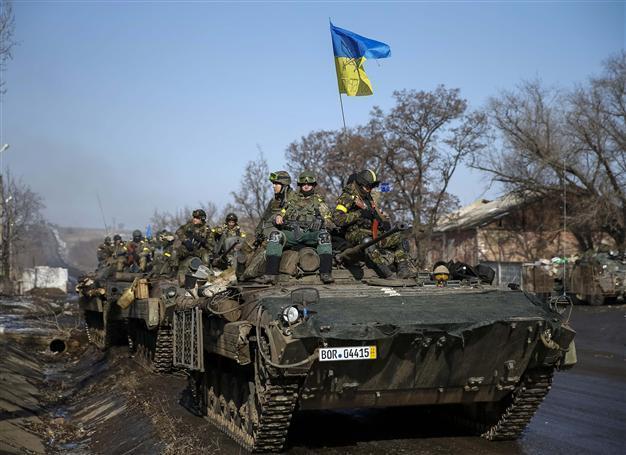Ukraine death toll grows after fragile peace deal signed
KYIV - Agence France-Presse

Members of the Ukrainian armed forces ride on armoured personnel carriers (APC) near Debaltseve, eastern Ukraine, February 12, 2015. REUTERS Photo
At least 15 people have been killed in east Ukraine in new shelling despite the signing of a peace deal to end the 10-month conflict.Pro-Moscow rebels and government officials said Friday that seven civilians were killed across the conflict zone during the past 24 hours while Ukraine's military said eight soldiers lost their lives. The unrest came as Europe warned Russia it risked fresh sanctions if the fighting did not stop.
The rebels and Kyiv agreed a peace plan Thursday after marathon talks in the Belarussian capital Minsk between the leaders of Russia, Ukraine, France and Germany.
A ceasefire across the conflict zone is meant to start at midnight Ukraine time Sunday (2200 GMT Saturday) with both sides supposed to begin pulling back heavy weaponry from along the frontline no later than two days after that.
The fragile agreement is seen as the best hope of ending the conflict, which has killed at least 5,480 people and ratcheted East-West tensions to highs not seen since the Cold War, but skepticism remains high after the collapse of a similar previous peace plan.
Kyiv and the West accuse Russia of stoking the war in ex-Soviet Ukraine by pouring arms and troops to help the pro-Russian rebels fighting Kiev government troops in Ukraine's industrial east. Moscow denies the charges.
Speaking late Thursday after a European Union summit in Brussels, German Chancellor Angela Merkel warned Russia that the bloc, which has already slapped Moscow with sanctions over the crisis, was not ruling out further measures if the truce failed.
"If it works well we would be very happy to go with the agreement. If there are difficulties we wouldn't rule out other sanctions," she said.
French President Francois Hollande, who along with Merkel attended the 17-hour talks in Minsk that also included Russian President Vladimir Putin and Ukrainian President Petro Poroshenko, agreed.
If the truce was not respected, "we would return to a process... of sanctions that would be in addition to those already in place."
In the run-up to the truce, Ukraine's military said Friday that fighting remained fiercest around the key strategic town of Debaltseve.
Ukraine said rebels had fired missiles at the beleaguered railway hub, mid-way between the main separatist bastions of Donetsk and Lugansk.
An AFP journalist in the rebel capital of Donetsk said that sporadic missile salvos and dozens of artillery bombardments could be heard around the city early Friday morning.
The Ukrainian government on Thursday accused Russia of deploying another 50 tanks across the border during the talks in Minsk.
The United States, which has said it could supply Ukraine with weapons if the conflict continues, cautiously welcomed the peace accord, but emphasised the work yet to be done in making it stick.
"The true test of today's accord will be in its full and unambiguous implementation," the White House said, including "restoration of Ukrainian control over its border with Russia."
The Kremlin said that it had supported an immediate ceasefire but rebels had pushed for a delay in the start of the truce.
Putin "put in quite a bit of effort to persuade the rebels to sign the document," spokesman Dmitry Peskov was quoted as saying Friday by the Kommersant daily.
A Ukrainian source, however, told AFP that Russia initially called for the start of the ceasefire to be delayed for a week.
Rebel leaders -- seen by the West as Kremlin puppets -- have said that the new deal raises hopes of peace but warned there would be no more talking if it fails.
The new Minsk agreement is broadly similar to an earlier failed deal in September, except that the new heavy weapons-free zone will be 50 to 70 kilometres (31-43 miles) wide, depending on the range of the weapon, double the width of the buffer zone agreed in September.
Kyiv will also begin retaking control over the approximately 400-kilometre (250 mile) stretch of Russia's border with rebel-held Ukraine, but only after local elections are held.
The border is entirely under Russian and pro-Russian rebel control and is used, according to Kyiv, as a conduit for separatist supplies. The Kremlin denies this but has opposed Ukraine being allowed to regain control of the frontier.
Separatist-held territories will be granted a degree of autonomy to be established through talks, and the right to decide which language they use.
In a much-needed boost for Ukraine's failing economy the IMF announced a Thursday new financial rescue plan worth $17.5 billion, taking the total international aid the country will receive over the next four years to 440 billion (35 billion euros).
















